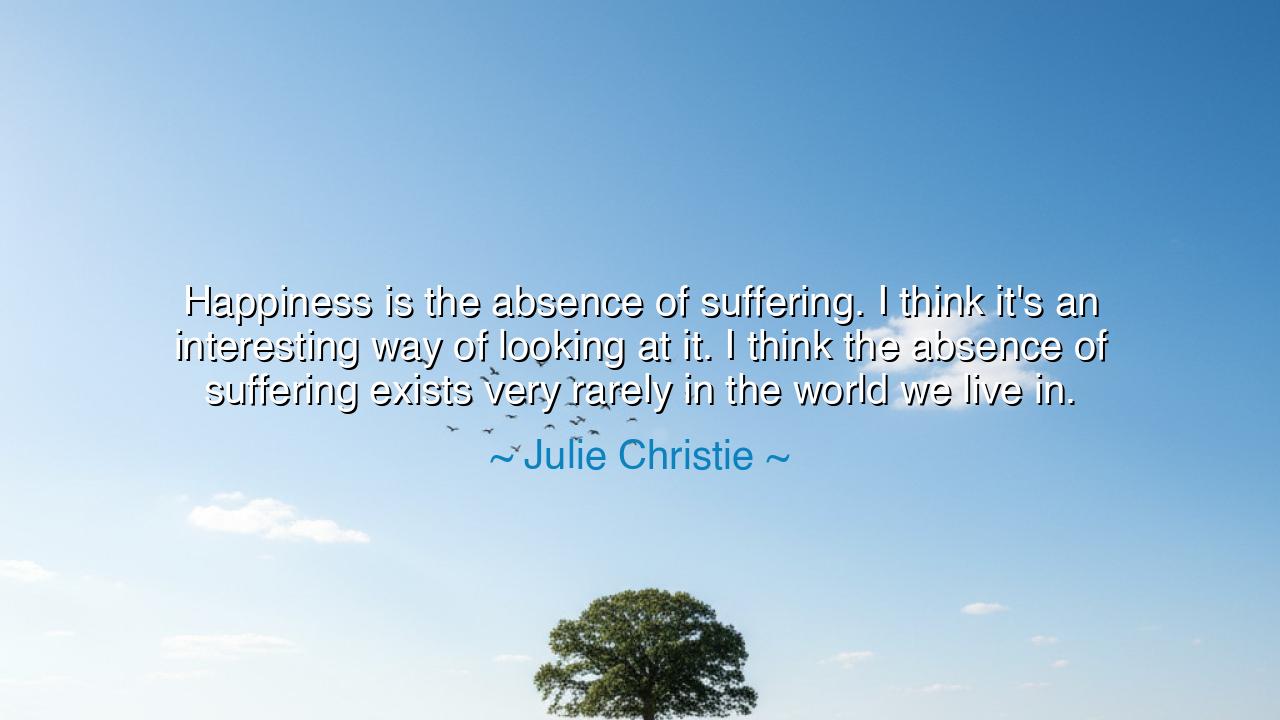
Happiness is the absence of suffering. I think it's an
Happiness is the absence of suffering. I think it's an interesting way of looking at it. I think the absence of suffering exists very rarely in the world we live in.






“Happiness is the absence of suffering. I think it’s an interesting way of looking at it. I think the absence of suffering exists very rarely in the world we live in.” So spoke Julie Christie, with the quiet wisdom of one who has seen both the splendor and sorrow of life. In her words lies not cynicism, but clarity—a recognition that happiness is not the eternal flame we imagine it to be, but a fragile stillness between storms, a brief peace in the long struggle of existence. She does not define happiness by laughter or abundance, but by a more sacred measure: the absence of suffering, that rare moment when the heart ceases its battle and the soul rests, untroubled.
To the ancient mind, this vision would not seem strange. The Buddha, long before Christie, taught that life is woven with dukkha—suffering, impermanence, the aching incompleteness of all things. Yet he also taught that liberation comes not by escaping life, but by transforming our relationship to it. Happiness, in this light, is not something to be added to life, but something that remains when pain and desire fall silent. It is what remains when the fires of craving burn out. Julie Christie, in her reflection, reminds us of this timeless truth—that happiness is not a possession, but a pause, a breath between griefs, a moment when the storm within us calms.
And yet, she speaks also to our age—to a world restless, noisy, and endlessly seeking. Ours is an era obsessed with pleasure and stimulation, and yet, for all our abundance, we suffer deeply. We chase happiness as if it were a thing to be purchased or pursued, while ignoring the silence that must make it possible. The ancients would call this folly, for one cannot fill a cup that is already overflowing. As Christie observes, “the absence of suffering exists very rarely”—not because life denies it, but because we have forgotten how to be still long enough to feel it. We build towers of distraction, but peace is found only in emptiness.
Consider the story of Epictetus, the slave-turned-philosopher. He was beaten, mocked, and bound by chains, yet he taught that suffering arises not from events, but from our judgment of them. When asked how one might be happy in hardship, he replied, “By refusing to suffer in spirit what the body must endure in flesh.” His happiness came not from comfort, but from freedom of the mind—a freedom that exists when the soul ceases to resist the flow of fate. Like Christie, he understood that true peace does not come from gaining, but from letting go. The absence of suffering, even for a moment, is the highest form of grace.
It is easy to hear such words and feel despair—to think happiness impossible, since suffering surrounds us. But this would be to miss the deeper meaning. Julie Christie does not mourn the rarity of peace; she calls us to cherish it. For if happiness is the absence of suffering, then even the smallest reprieve—a quiet morning, a breath unburdened by worry—is a treasure beyond gold. The rarity of peace makes it sacred. Like sunlight through storm clouds, its fleetingness only heightens its beauty. To live wisely is not to escape pain, but to recognize the holy moments when pain falls away.
The lesson, then, is not to chase constant happiness, but to cultivate awareness of its moments. When life grants you a still hour, honor it. When pain subsides, even briefly, breathe deeply and give thanks. Learn to see happiness not as a distant summit, but as a small clearing in the forest—a place you may rest before the journey resumes. For those who know how to recognize peace, it will appear more often, and its duration will grow. But those who demand perpetual joy will miss it entirely, blinded by their own striving.
To live by this wisdom, one must practice contentment—a discipline of the heart. Be gentle with your suffering, and do not deny it, for it is the shadow that defines the light. When sorrow visits, greet it as a teacher. When joy appears, receive it with humility, knowing it will pass. And when you find, even for a heartbeat, the absence of suffering, do not rush to fill the silence. Sit within it. Feel its stillness spread through you. In that stillness lies the true meaning of happiness—not loud, not triumphant, but calm, steady, and profoundly alive.
So remember Julie Christie’s reflection. The world will never be without sorrow, but within it, peace can still be found. Seek not a life without storms, but a heart that remains unbroken in their midst. For happiness, in its purest form, is not the endless laughter of the fortunate—it is the quiet victory of the spirit that has learned, at last, to rest.






AAdministratorAdministrator
Welcome, honored guests. Please leave a comment, we will respond soon